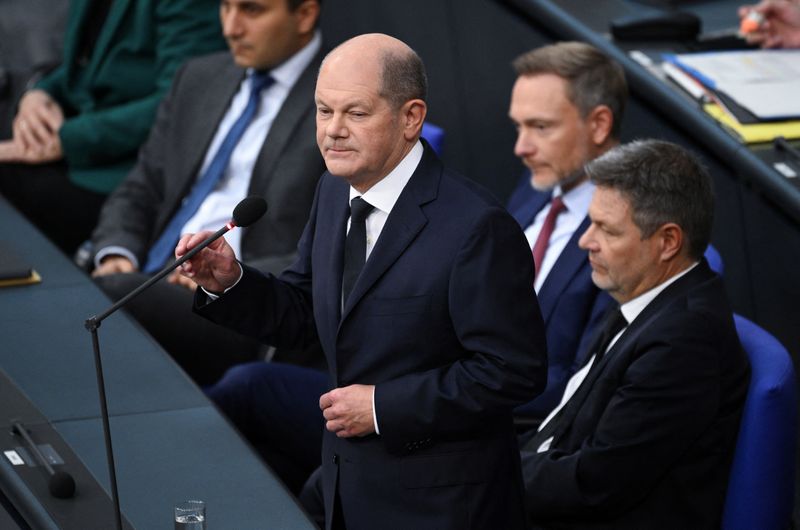By Maria Martinez
BERLIN (Reuters) -Germany's ruling coalition on Thursday was scrambling to fix a large hole in its finances after a court ruling blocked the government from transferring unused emergency funds from the pandemic towards green initiatives and industry support.
The decision by the constitutional court on Wednesday to wipe 60 billion euros ($65 billion) from the budget has prompted the government to postpone the formal vote of the budget committee until next week after an extraordinary meeting to be held on Tuesday.
Wednesday's ruling by the constitutional court dealt a major blow to an already fractious coalition under Chancellor Olaf Scholz, whose popularity has slumped as Europe's largest economy teeters on the brink of another recession.
Scholz said on Thursday that the 2024 federal budget will include record investments despite the court ruling.
"The fact that we will achieve a record rate of investment will be guaranteed in any case," Scholz said in Berlin.
According to the last draft budget, there will be record investment of 54 billion euros next year.
"We also need future investments in Germany, especially when it comes to infrastructure," Scholz said.
Economy Minister Robert Habeck, a member of the pro-spending Greens, called the verdict "a huge blow to industrial policy".
He compared the climate fund to the Inflation Reduction Act in the United States, which provides billions of dollars in tax credits for green-friendly industries and has lured away some European industry to the United States.
Habeck warned the court ruling put at risk support for the steel sector, which is counting on subsidies to decarbonise and stay competitive.
“Yesterday’s ruling is a tough challenge for this industry," he said. "So we have to find the money elsewhere."
Finance Minister Christian Lindner meanwhile said it was too early to discuss the consequences of the court ruling.
But in a sign of the potential wrangling to come, he stressed the government would stick to its main policy planks, including no tax hikes and adhering to a constitutionally enshrined debt brake.
"The court's decision brings a budgetary dilemma, forcing the government to choose between slashing climate spending or finding new sources of financing," said Yesenn El-Radhi, a vice president at ratings agency DBRS Morningstar.
It will also heap pressure on the fiscally hawkish Lindner, who has yet to divulge a promised "Plan B" on which projects would have to be put on hold or where more money might come from.
It could also put Lindner on the backfoot in negotiations to reform the European Union's fiscal rules in a pan-European deal by the end of the year. On Friday, he will meet his French counterpart in Berlin for talks on fiscal discipline, sources told Reuters.
CHANGE IS HARDER
The 60 billion euros had been earmarked for initiatives such as making buildings more energy efficient and subsidising renewable electricity and chips production, as well as supporting energy-intensive companies.
Budget cuts would put at risk the ambitious goals of Germany as the European leader of the green transition. Germany aims to cut greenhouse emissions by 65% by 2030, with a longer-term net zero target by a 2045.
The head of Thyssenkrupp (ETR:TKAG)'s steel business Bernhard Osburg called for clarity from the government, arguing that financial support for a greener steel industry would help Germany advance towards its climate goals.
In particular, further work must be done to keep electricity prices affordable, he said. "The steel industry alone can contribute to reducing a third of total industrial emissions - and thus has enormous leverage to save millions of tons of CO2 in the coming years."
Attention could also now turn to other off-budget funds, 29 in total worth a total volume of 869 billion euros, that could be challenged in court.
The German economy has already been struggling to grow due to weak foreign demand, high inflation and a record high interest rate set by the European Central Bank.
"For 2024, it will hardly have an impact on growth but for the following years the 60 billion euro hole will make structural changes harder and hence increases the likelihood of a longer stagnation," said ING's economist Carsten Brzeski.
"The debt brake was useful in the 2010s but given the long list of structural challenges, Germany's problem is not debt sustainability but too low growth and a worsening of international competitiveness," he said.
The government could pursue various options, including suspending the debt brake or trying to reform it. Or, according to Berenberg bank, the government may look for some additional wriggle room by shifting spending to public-private partnerships (PPP) or to the state-owned development bank KfW.
"The economic bottom line is that the court has ordered a €60bn austerity programme to be unrolled over a number of years," said a note by Eurointelligence.
"The political bottom line is that many coalition disputes will reopen as serious budget constraints kick in. Christian Lindner's credibility is shot."

For an EXPLAINER on the impact of the budget ruling, see Full Story
($1 = 0.9220 euros)